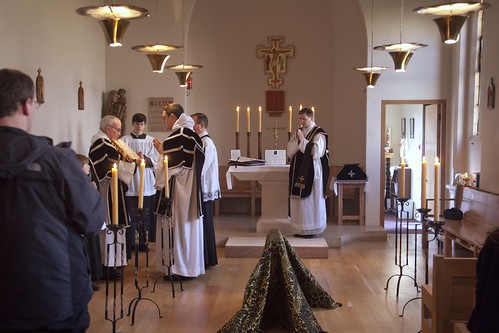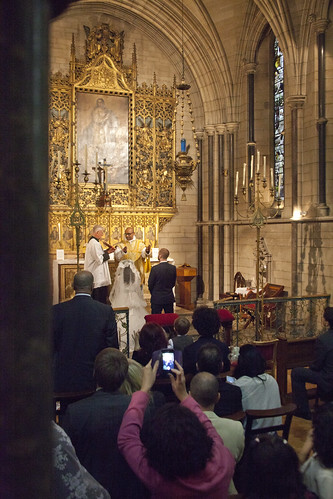 |
| The solemn proclamation of the Gospel at a Traditional Requiem Mass. |
'It was for your hardness of heart [Greek: 'sklerocordia'] that Moses gave this commandment.' (Matthew 19:8)
It was because Jesus wants to break through that hardness of heart, because he offers, to use the phrase of Ezekial (36:26) to replace our heart of stone with a heart of flesh, that he wants to put a stop to divorce, or at least the respectable re-marriage to another spouse which is the hard-hearted intention of most divorces.
One of the reasons that the Church is finding it difficult to hold the line on divorce is that, if we are honest with ourselves, the teaching on the indissolubility of marriage has not been presented with forcefulness for half a century at least. The Church is full of compassion for those who are going through marital difficulties, for the separated, for the divorced, and for the remarried. That is a good thing. But we aren't sent simply to weep by the sidelines; the Church is supposed to have some insight into human nature. What are these people told to do? Are they told that divorce and remarriage, as a solution for marital problems, overwhelmingly often has catastrophically bad consequences for both spouses and especially for the children? Are they told that the marriage vow imposes a sacred obligation to remain with one's spouse, that the grace of the sacrament will assist with the common life of marriage, and that infidelity is poison to the life of grace and to the marital relationship?
I know that there are some priests, some catechists and people doing marriage preparation, and some theologians writing on these matters, who do say these things, but they need to say them more loudly if they want to be heard over the din of the values and customs of the World. The message that a lot of Catholics hear is that many divorces can be 'sorted out' with the help of a little canon-law jiggery pokery (perhaps, jiggery-popery).
What we need to bear in mind is that the line taken by the world is that married people can divorce if they consider themselves unhappy. How dreadful, the wordlings say, to be 'trapped in a loveless marriage': 'loveless', by which they do not mean abusive, intolerable, or invalid, or a marriage where the spouse refuses to have children or insists on aborting them, where the spouse is an alcoholic or a criminal, or anything life that. A marriage can, and perhaps should, be destroyed, the World informs us, if it doesn't make one of the spouses happy, which is understood as meaning that it fails to deliver that romantic tingle which is everyone's inalienable right.
Remarriage, of course, is the whole point of such divorces: not physical separation from a wife-beating maniac for the sake of the children (perhaps followed by recourse to civil divorce to enforce the just distribution of assets): no, legal separation from a nice but boring spouse for marriage with the glamorous alternative who will fulfill one's dreams.
Denying a core doctrine of the World always takes a bit of effort, a courageous moral effort and an effort of proclamation to get the message across. I ask again, do Catholics and non-Catholics understand clearly that the Church condemns utterly this worldly thinking? That it is what Our Lord and Merciful Saviour called hardness of heart? Or are we inclined to sympathise publicly with the divorcing party and tell him or her how glad we are when, as it may appear, he or she has at last 'found happiness'?
There are some indications that the latter is more the case. On a blog by an Evangelical concerned to defend marriage I found a some pretty shocking examples of responses to questions on the 'Catholic Answers' website, which completely failed to take the opportunity presented to remind enquirers of the beautiful teaching of the Church, and of Christ, on marriage, and which suggest a deep reluctance to oppose the teaching of the World. There is more to the Church than Catholic Answers, I know, but it is a straw in the wind.
 |
| The Blessing of Bride and Groom in the Traditional Nuptial Mass. |
Even when the party at issue tells us it was done for the sake of happiness? For that romantic tingle which, the World says, is the key to the meaning of life?
If we are going to deny this, friends, we need to do so loudly enough to be heard.
Support the work of the LMS by becoming an 'Anniversary Supporter'.
Has any Catholic teaching been "presented with forcefulness for half a century at least."? I can't think of any except the commandment "Thou shalt not criticize Vatican II."
ReplyDeleteAs most priests in this country seem to delegate any teaching on marriage to "Marriage Care", there is no wonder that most Catholics have succumbed to the socially acceptable norms of marriage and sexuality.
Fair point!
DeleteMarriage Care, for those who don't know, are 'relationship counsellors': they will help your relationship whether it is a matter of fornication, adultery, or unnatural vice. 'Non-judgmentally', of course. It was once a Catholic organisation and on the strength of this maintains a whole section in the Catholic Directory and pride of place on many parish notice-boards and Catholic website links pages.
The recent push to permit the reception of Holy Communion for the divorced and remarried, people who are in mortal sin, and also, likewise, for practising homosexuals, is not what it is presented as. It has nothing to do with any concept of mercy. It is a ploy to achieve an end.
ReplyDeleteThat end, is the diminishing of doctrines of the Catholic Church.
The obvious one is the Indissolubility of Marriage. But there are others. If those in a state of grave sin can receive the Consecrated Host then by definition that piece of bread is not Consecrated. It is a piece of bread. If the Real Presence is invalidated, then so is the function of the Ordained Priesthood, the ability of a man under Holy Orders, to act “in persona Christi”.
Therefore, four Sacraments, the Eucharist, Confession, witnessed Marriage, and Holy Orders are effectively invalidated or, “Gradualism” out of existence. That is the objective, the Protestant position, although I suspect the intention of the Relativisers will go further even than that, if they are successful.
The second session of the Synod on the Family will settle this and as such, will be so much more important than the fifty years of chipping away at Catholicism we have experienced post Vat-II.
I think all Catholics in Continuity should be aware of this.
Should have been "Gradualised"
DeleteRe the "hardness of heart" of the Israelites with regards to divorce. I have read at least 2 exegetes who postulated that the cause of Moses' permission for divorce was that he knew the Israelites would kill their wives when a newer model came along if they were not given a get-out clause. Thus divorce was permitted against the letter and spirit of the law in order to prevent the greater evil of murder which would result from their hardness of heart.
ReplyDeleteFor the life of me I can't remember where I read that, and I wondered if anybody else had come across this exegesis?
Sounds very dubious to me. After all, killing one's wife is itself against the Law. The death penalty would seem a reasonably effective disincentive.
DeleteTrue, but they still weren't known at that time for keeping the Law very well - despite the disincentives.
DeleteAnd when you consider a Middle-Eastern culture where you only need to call one other favourable witness, you do not need to produce a male party to the offence, and the witness of women counts for nothing in the law, it is very easy to accuse a wife of adultery and have her disposed of that way - entirely within the letter of the law (or at least, a very Pharisaical understanding of the letter of the law.)
Not that stoning of women to death for adultery occurs anywhere these days, of course.